Old Testament
Genesis Exodus Leviticus Numbers Deuteronomy Joshua Judges Ruth 1 Samuel 2 Samuel 1 Kings 2 Kings 1 Chronicles 2 Chronicles Ezra Nehemiah Esther Job Psalms Proverbs Ecclesiastes Song of Solomon Isaiah Jeremiah Lamentations Ezekiel Daniel Hosea Joel Amos Obadiah Jonah Micah Nahum Habakkuk Zephaniah Haggai Zechariah MalachiNahum 2:9 Similar Verses
Nahum 2:9 Cross References
Take ye the spoil of silver, take the spoil of gold: for there is none end of the store and glory out of all the pleasant furniture.
Uncover the Rich Themes and Topics of This Bible Verse
Listed below are the Bible themes associated with Nahum 2:9. We invite you to explore each theme to gain deeper insights into the Scriptures.
Nahum 2:9 Cross Reference Verses
This section features a detailed cross-reference designed to enrich your understanding of the Scriptures. Below, you will find carefully selected verses that echo the themes and teachings related to Nahum 2:9 KJV. Click on any image to explore detailed analyses of related Bible verses and uncover deeper theological insights.
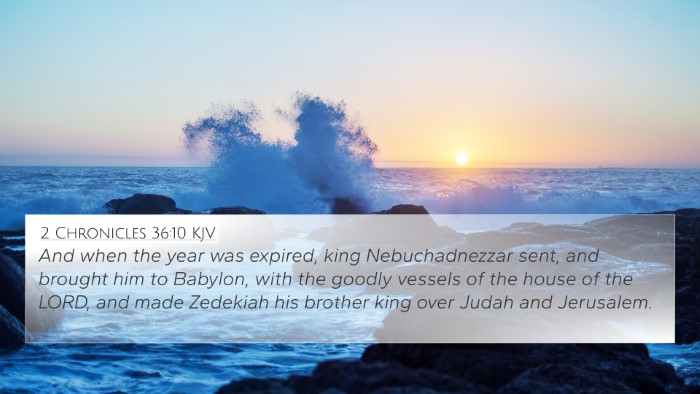
2 Chronicles 36:10 (KJV) »
And when the year was expired, king Nebuchadnezzar sent, and brought him to Babylon, with the goodly vessels of the house of the LORD, and made Zedekiah his brother king over Judah and Jerusalem.
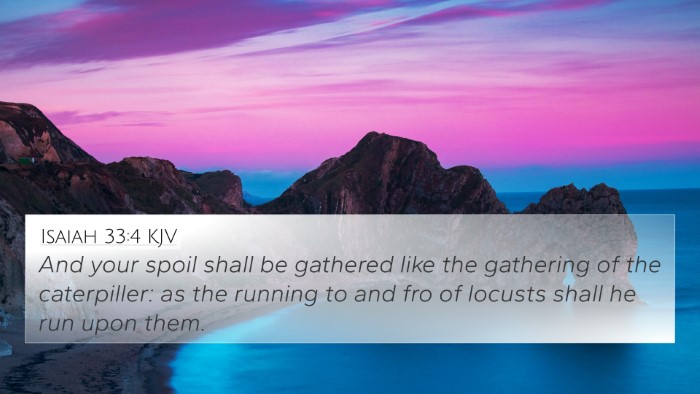
Isaiah 33:4 (KJV) »
And your spoil shall be gathered like the gathering of the caterpiller: as the running to and fro of locusts shall he run upon them.

Jeremiah 25:34 (KJV) »
Howl, ye shepherds, and cry; and wallow yourselves in the ashes, ye principal of the flock: for the days of your slaughter and of your dispersions are accomplished; and ye shall fall like a pleasant vessel.
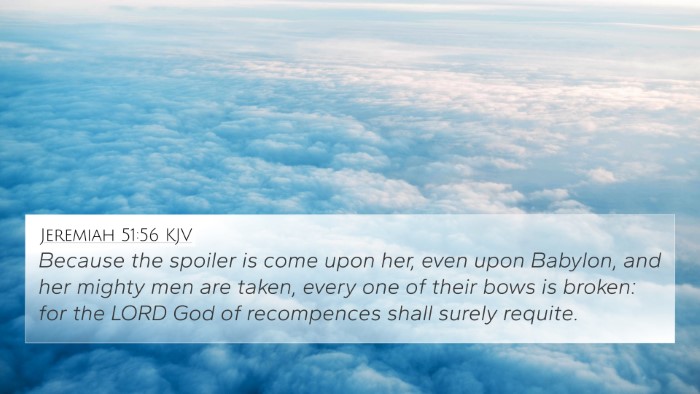
Jeremiah 51:56 (KJV) »
Because the spoiler is come upon her, even upon Babylon, and her mighty men are taken, every one of their bows is broken: for the LORD God of recompences shall surely requite.
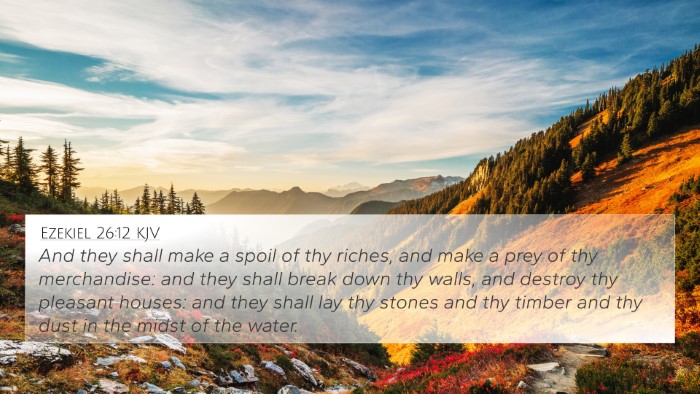
Ezekiel 26:12 (KJV) »
And they shall make a spoil of thy riches, and make a prey of thy merchandise: and they shall break down thy walls, and destroy thy pleasant houses: and they shall lay thy stones and thy timber and thy dust in the midst of the water.
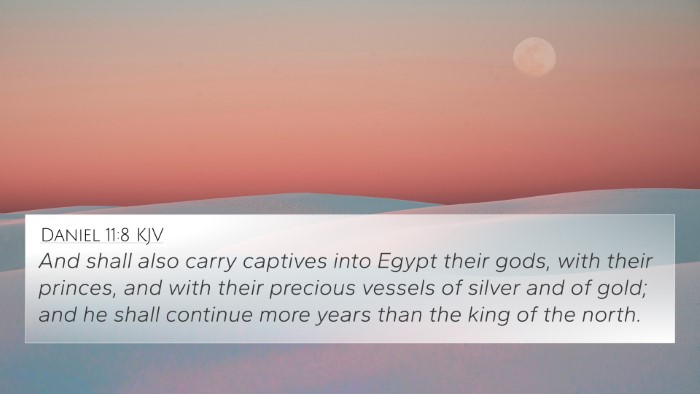
Daniel 11:8 (KJV) »
And shall also carry captives into Egypt their gods, with their princes, and with their precious vessels of silver and of gold; and he shall continue more years than the king of the north.

Nahum 2:12 (KJV) »
The lion did tear in pieces enough for his whelps, and strangled for his lionesses, and filled his holes with prey, and his dens with ravin.
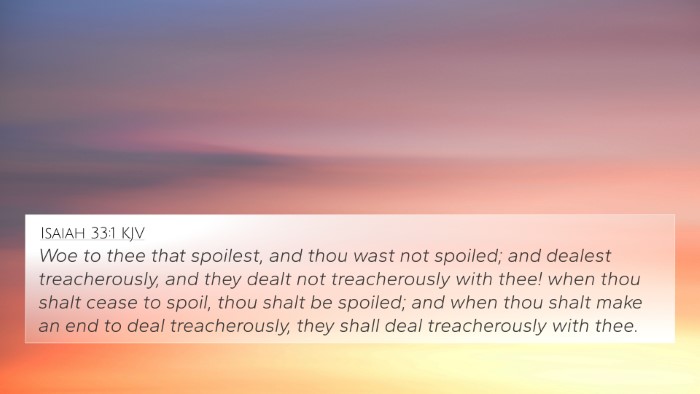
Isaiah 33:1 (KJV) »
Woe to thee that spoilest, and thou wast not spoiled; and dealest treacherously, and they dealt not treacherously with thee! when thou shalt cease to spoil, thou shalt be spoiled; and when thou shalt make an end to deal treacherously, they shall deal treacherously with thee.
Nahum 2:9 Verse Analysis and Similar Verses
Understanding Nahum 2:9
The verse Nahum 2:9 reads: "Take ye the spoil of silver, take the spoil of gold: for there is none end of the store and glory out of all the pleasant furniture." This verse speaks of the impending judgment upon Nineveh and encourages the destruction and plundering of its wealth.
Overview of Nahum 2:9
In Nahum, the prophet conveys God's message about the fall of Nineveh, the capital of Assyria. This particular verse highlights the riches of Nineveh, suggesting they are ripe for the taking because of their impending doom.
Commentary Insights
Matthew Henry's Commentary
Henry notes that the abundance of wealth in Nineveh is to be stripped away as punishment for its sins. The riches accumulated through oppression and violence will be taken by the invaders, emphasizing the justice of God in balancing the scales.
Albert Barnes' Commentary
Barnes explains that the imagery of spoils reflects the comprehensive defeat of Nineveh. The reference to the endless stores of gold and silver signifies not only the city's wealth but also its moral decay, showcasing how both riches and corruption will ultimately lead to destruction.
Adam Clarke's Commentary
Clarke elaborates on the significance of the spoils, indicating that the wealth of Nineveh is not merely for material gain, but serves as a testament to God's judgment on those who indulge in excess and wickedness. The “pleasant furniture” symbolizes the luxurious lifestyle that will come to an end.
Key Themes and Messages
- The Justice of God: The destruction of Nineveh is a reminder of God's judgment upon nations that turn away from righteousness.
- Wealth and Corruption: The connection between wealth accumulation through corrupt means and eventual downfall is highlighted here.
- Impending Doom: This verse serves as a warning about the transient nature of power and riches.
Cross-References for Nahum 2:9
- Isaiah 10:12-14: Discusses God's judgment upon Assyria and its pride.
- Zephaniah 2:15: Describes the fate of Nineveh and the consequences of its actions.
- Revelation 18:16: Likens the fall of Babylon to that of Nineveh regarding wealth and glory.
- Jeremiah 50:37: Talks about the destruction of the wealth of Babylon, showing a parallel to Nineveh's fate.
- Proverbs 13:22: Highlights the idea of the sinner’s wealth being stored up for the righteous.
- Matthew 6:19-20: Advises against storing treasures on earth, reflecting the futility of wealth.
- Ezekiel 27:12: Discusses trade and wealth of Tyre, drawing a comparison to Nineveh's riches.
Connections Between Bible Verses
Understanding Nahum 2:9 involves looking at other biblical texts that discuss themes of judgment, wealth, and moral decline. Cross-referencing these verses enhances the comprehension of the theological and moral lessons embedded in the scripture.
Thematic Bible Verse Connections
The themes present in Nahum 2:9 are prevalent throughout both the Old and New Testaments, where warnings against pride, excess, and corruption echo in various narratives:
- The theme of divine justice is central in the messages delivered by the prophets.
- Wealth as a double-edged sword is shown in multiple stories such as Job's, Solomon's, and the warnings given by Jesus.
- God’s punishment of nations serves as a stark reminder of his sovereignty over worldly powers.
Conclusion
Nahum 2:9 serves as a profound reminder of the consequences of moral decay associated with wealth. By contemplating this verse through various commentaries and cross-references, readers can deepen their understanding of God’s righteous judgment and the themes that resonate throughout scripture.


